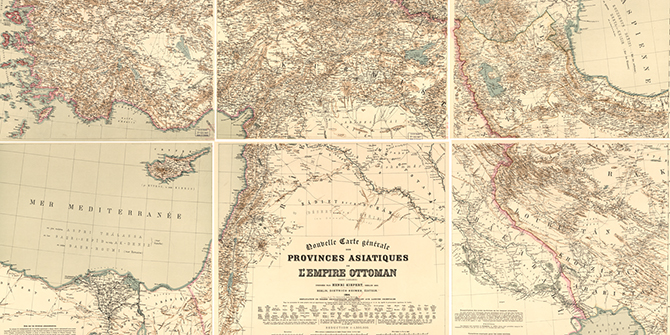by Cengiz Gunes
#Rojavaat4
This memo was presented at a workshop organised by the LSE Middle East Centre examining the experiment in Western Kurdistan. A report providing a distillation of the presentations and discussions is available to download here.

The developments in the majority Kurdish regions of Syria (known as Rojava) since the outbreak of conflict in 2011 have shone a focus on the PKK’s (Kurdistan Workers’ Party) role and the extent to which the ascendency of the Kurds in Syria is benefiting the PKK. Turkey’s attempts to reduce the wider Kurdish movement in Syria to the PYD (Democratic Union Party), and equate it with the PKK to delegitimise it internationally seem to have failed. The central role that the Kurdish forces in Syria are playing in combating IS has significantly aided the Kurds’ rising international legitimacy.
Since the PKK was established in 1978, its struggle has been mainly against Turkey. However, it maintained a pan-Kurdish stance with the unification of Kurds in an independent, united and socialist republic being its early political aim. The PKK has been operating in Syria since the early 1980s and Kurdish populations there have been an important human resource and source of logistical support for the PKK. Its ability to form strong ties with the Kurdish communities in Syria can be identified as a significant factor in the success of its struggle against Turkey during the 1980s and 1990s.
Since 1999, the PKK gradually moved away from the idea of an independent state for the Kurds and began to frame its political objectives around finding a solution to the Kurdish question via building an alternative institutional set-up in the region. Since August 2010 ‘Democratic Autonomy’ has been used to describe the specific proposals for the solution of the Kurdish question that the PKK aims to develop. Democratic autonomy seeks to address a number of issues: self-determination and language rights, cultural autonomy for the Kurds as a group and, on a broader level, the democratisation of society and the state.
It is within this context that the developments in the Kurdish majority regions of Syria assume importance for the PKK. Rojava provides an opportunity to put into practice at grassroots level the model developed by the PKK to resolve the Kurdish question in the region.
The consolidation of Kurdish self-rule in Syria is seen as an important first stage in the transformation of the Kurdish conflicts in Turkey and to a certain extent in Iran. Kurdish self-rule in Rojava is an opportunity that will provide the Kurds with a base to influence political developments in Syria and Turkey and help build a regional consensus on the accommodation of Kurdish rights within the existing states. Turkey’s Kurdish conflict has strong regional dimensions and the close political and cultural ties between the Kurds in Turkey and Syria means that the consolidation of Kurdish self-rule in Syria is bound to also empower Turkey’s Kurdish movement and make it a stronger regional actor.
The Kurds’ long-term success in the region is closely tied to the transformation and to finding a political settlement for the numerous Kurdish conflicts in the region. For this to be realised, a new framework for the accommodation of Kurdish rights is needed on the regional level. The main barrier to such a transformation is the opposition of the dominant regional powers. However, the accommodation of Kurdish rights within the existing state boundaries can enjoy support from international powers involved in the conflicts in Iraq and Syria. The resolution of the Kurdish conflicts within the territorial integrity of the existing states would greatly contribute to the stability of the region. To achieve long-lasting peace and stability in the Middle East, the Kurdish demands for self-rule need to be accommodated.
The rise of a new Kurdish entity in Syria provides the Kurds with an opportunity to form new alliances with international powers and use it to empower themselves vis-a-vis the regional powers. One of the main weaknesses of the Kurdish movement in Turkey has been the limited international support it was able to garner, which was mainly due to it being perceived as an illegitimate actor. Historically, the lack of allies has meant that the Kurds in the region were not able to consolidate the gains from their struggle. The increasing international legitimacy of the Kurdish movement in Syria is seen by the PKK as an opportunity to unlock the existing stalemate in the Kurdish conflicts in the region and move towards the ‘solution’.
The Kurds in Syria have been strengthening their position via cultivating stronger relations with the international powers involved in the region. Their relations with the international powers affect the approach the regional powers are taking towards the Kurds. In Syria, the Kurds have managed to manoeuvre out of a very tricky situation in the conflict with IS and that has increased their legitimacy. They have become an integral part of the war against IS and that position can enable them to increase their leverage and pursue their objective of building a decentralised administrative framework in Syria.
Cengiz Gunes is Associate Lecturer at the Open University. He is the author of The Kurdish National Movement in Turkey: From Protest to Resistance (Routledge, 2012) and co-editor of The Kurdish Question in Turkey: New Perspectives on Violence, Representation, and Reconciliation (Routledge, 2014). His main research interests are in identity and nationalism, peace and conflict studies, and the international relations of the Middle East. Cengiz tweets at @cgunes07.
Other Contributions
- Dissecting the YPG: Operations and Strategies as the Defender of Rojava
by Wladimir van Wilgenburg
- Are the old Syrian Kurdish parties relevant anymore?
Harriet Allsopp
- How does Turkey solve a problem like Rojava?
Zeynep Kaya






The new model of democracy being practised in Rojava is based on Ocalan’s ‘Democratic Confederalism’, which a paradigm shift from his previous Marxist political philosophy, and indeed any ‘democracy’ practised worldwide today.